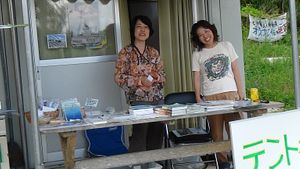On Sunday, January 19, the small city of Nago in northern Okinawa re-elected their mayor. Americans especially will wonder why a local election in a far-off place should matter. Because by voting for Mayor Susumu Inamine people voted against Japanese Prime Minister Shinzo Abe and the United States military. Local fishermen and farmers voted yes to their traditional way of life, no to American helicopters polluting the pristine waters of Oura Bay.
For years fishermen and farmers of all ages have maintained a tent city on Oura’s shores at Henoko to protest construction of a new American base while plans moved slowly ahead and huge roads appeared in the jungle-covered hills leading to the coastline area. Protestors have stayed even when the political ground has shifted away from their aims. When they discovered that the government would go ahead with surveys of the bay — even though locals had successfully voted against them — the movement’s leaders prepared a different action plan, training in sea kayaking. The anti-base citizens began a more visible, non-violent sit-in on the Henoko dock to block survey boats, yet the Japanese government made clear that construction would begin, forcibly if necessary: villagers would likely encounter physical harm and/or arrest by participating in the movement. People have come from all over Japan to join their effort.
Despite Washington’s desire for a new heliport, the United States must recognize Inamine’s win as legitimate and must acknowledge the will of his and Henoko’s supporters. Nearly twenty years ago, Washington announced plans for this new base in part to offset Okinawans’ fury over a rape near the Futenma base on the other side of the island. Locals sprang into action, realizing the quick fix and sleight of hand: to appease citizens’ anger about the violence associated with the American military presence in one part of Okinawa, the Americans would move out of sight. Higa Seijun first organized people into a movement known as the “Society for the Protection of Life.” Villagers who had never considered themselves politically active joined the cause.
The numbers remain small but consistently larger than the government-backed construction companies have anticipated; at one point, fearing confrontation, Japanese surveyors received special permission from the U.S. military command and launched their boats from nearby Camp Schwab instead of the public dock at Henoko. Protesters responded with a peaceful flotilla strategy: an “in water” sit-in made up of kayaks and other small craft. The struggle intensified with government-backed construction firms attempting to bore holes through the coral reefs to erect scaffolding on the one hand, while protesters tried everything in their power to stop them. In December 2004, several construction workers became reckless with their heavy equipment; a few members of the “Society for the Protection of Life” wound up in the hospital. News of their injuries outraged fishermen throughout Okinawa. In solidarity, they sailed to Oura Bay, expanding the resistance from protecting life in Henoko to protecting life in all of Okinawa.
During the past ten years, this contoured pattern of struggle has endured between those who would do the Americans’ bidding and build the proposed heliport and those who continue to live in tents on the beach and take to their kayaks in protest regularly to dispel surveyors and assessors. In the wake of Inamine’s victory, Tokyo says it will push ahead with construction for the Americans. Predicting what will transpire is not possible. Any future confrontation will likely result in violence, however – the death of a fisherman, perhaps – making the nature of American demands on Okinawa and Okinawans seem more real to many throughout Japan with unpredictable reverberations, including a breaking point in the U.S.-Japan Alliance.
The U.S. spends inordinate amounts of money trying to impose democracy around the world. It must recognize, and thus honor, democratic victories wherever they come, even if – especially if – they are in conflict with its own interests.
Alexis Dudden has written extensively about Japan’s international relations. She is professor of history at the University of Connecticut and visiting research fellow at Princeton University.
































